peer reviewed
Wiedner, J., & Schaeffer, M. (2024). Spatial overlap: trade-offs in refugees’ residential choices. Journal of Ethnic and Migration Studies, 1–23. https://doi.org/10.1080/1369183X.2024.2425213
This research has been covered by national and regional media including Süddeutsche Zeitung, FAZ, Die Welt, Deutschlandfunk, RBB radioeins and many others.
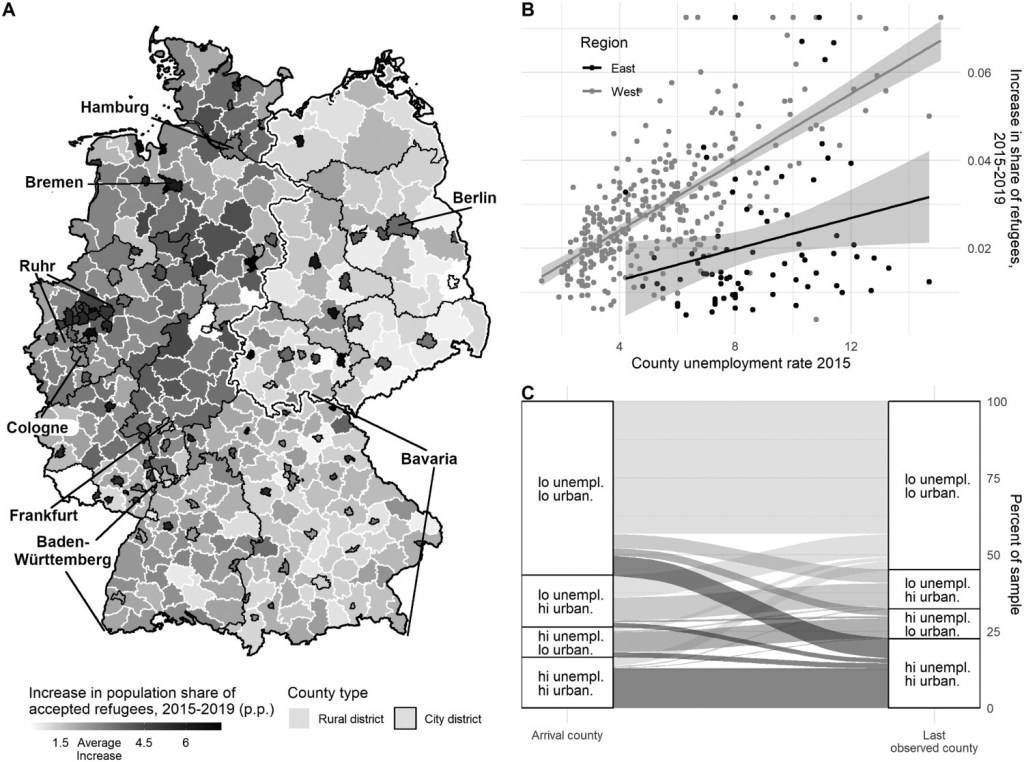
Social science research gives rise to what we call the ‘refugee mobility puzzle’: While restrictions on the freedom of residence limit refugees’ socio-economic integration, those who do not face such restrictions often move to areas with high unemployment that similarly hinder their labor market prospects. This study addresses a central element of this puzzle: What draws refugees to high unemployment areas? We propose the spatial overlap hypothesis arguing that refugees in comparatively generous reception systems initially prioritize or are forced to prioritize non-labor-market resources such as affordable housing and proximity to social networks. Thereby they often settle in areas with general economic disadvantage as such areas frequently overlap with said resources. Based on the IAB-BAMF-SOEP Survey of Refugees this study tracks residential histories of more than 2,400 refugee respondents across all German counties and postcodes. Discrete choice models show that preferences for cities, lack of affordable housing, the presence of small, service-oriented companies, and co-ethnic communities explain refugees’ gravitation to disadvantaged areas. These results support the spatial overlap hypothesis and suggest that recently approved refugees face trade-offs: area characteristics that are initially attractive tend to spatially overlap with such that likely inhibit longer-term integration prospects.
Under- or overexpansion of education? Trends in qualification mismatch in the United Kingdom and Germany, 1984–2017. Social Science Research, Volume 117, January 2024. https://doi.org/10.1016/j.ssresearch.2023.102948
Preprint available at SocArXiv: https://osf.io/preprints/socarxiv/s63dr/.
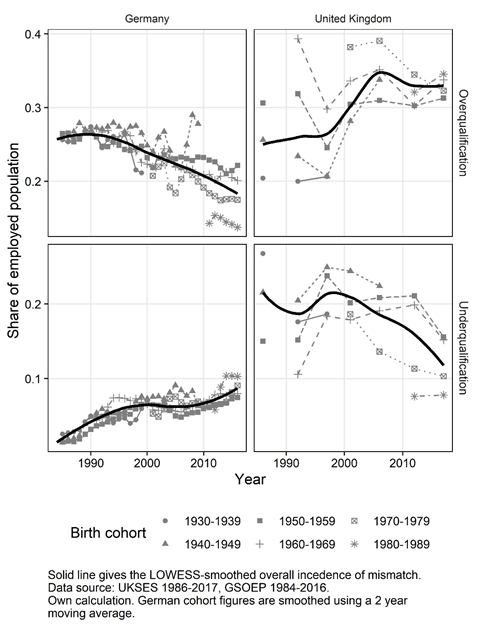
Prominent theoretical positions in sociology and labor economics disagree whether educational expansion has outstripped the demand for qualified labor (overexpansion), or whether economies face a skill shortage despite increases in education (underexpansion). Focusing on the United Kingdom and West Germany, two countries with dissimilar skill formation institutions, patterns of expansion, and labor markets, this paper asks to what degree expansion of education has been absorbed. I point out shortcomings of wage-centered analyses and develop an approach that focuses on trends in self-assessed over- and underqualification. Using repeated surveys among workers and official labor market statistics, I estimate regression models that link the cohort-level expansion of education to the cohort-level prevalence of mismatch. Results suggest overexpansion in the United Kingdom, with overqualification increasing and underqualification decreasing over historical times and cohorts. West Germany, on the other hand, shows signs of underexpansion. While dominant theoretical accounts focus on the under-/overexpansion of tertiary education, my results show that mismatch-dynamics in both contexts are strongest for workers without university degrees.
Wiedner, J., Schaeffer, M. & Carol, S. (2022) Ethno-Religious Neighborhood Infrastructures and the Life Satisfaction of Immigrants and their Descendants in Germany. Urban Studies. https://doi.org/10.1177%2F00420980211066412
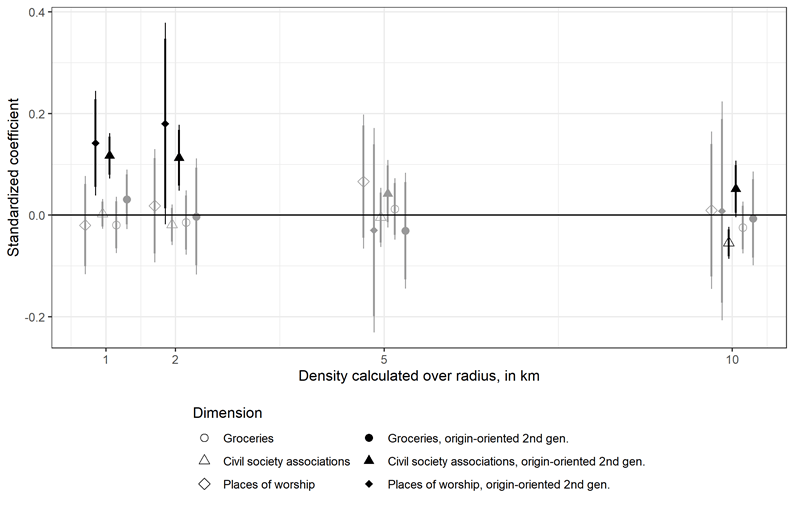
Urban research assigns immigrant enclaves an ambiguous role. While such areas are seen as rich in beneficial ethno-religious infrastructures and networks, they also tend to be located in deprived and stigmatized inner-city neighborhoods. Research on neighborhood attainment provides evidence for both, a desire to attain mainstream middle-class neighborhoods, which grows the more immigrants and their descendants establish themselves in society, but also a continuing attraction of residing close to co-ethnics. To tease apart this ambiguity, we study how the life satisfaction of immigrants and their descendants depends on the characteristics of the neighborhood they live in, and pay special attention to heterogeneity along generation, country of origin orientation and income. We use classic measures of neighborhood quality vis-á-vis newly collected data on the spatial density of ethno-religious minority associations, places of worship, and grocers. We link these data to the geocoded German Socio-Economic Panel to predict life satisfaction among immigrants and their descendants. To strengthen a causal interpretation of our results, we employ specifications that address self-selection into neighborhoods and unobserved confounding. Contra the assumptions of standard assimilation models, we document that ethno-religious infrastructures contribute to increased life satisfaction primarily among the second generation, and there especially among sending-country oriented individuals. This suggests a continuing importance of origin-culture infrastructures for some groups. Furthermore, we find little evidence that overall neighborhood quality, or the mere share of co-ethnics in a neighborhood increases life satisfaction either among immigrants or their descendants.
Wiedner, J. (2021) Political and Social Consequences of Qualification Mismatches. A bounding approach to status inconsistency. Social Forces, soab120. https://doi.org/10.1093/sf/soab120
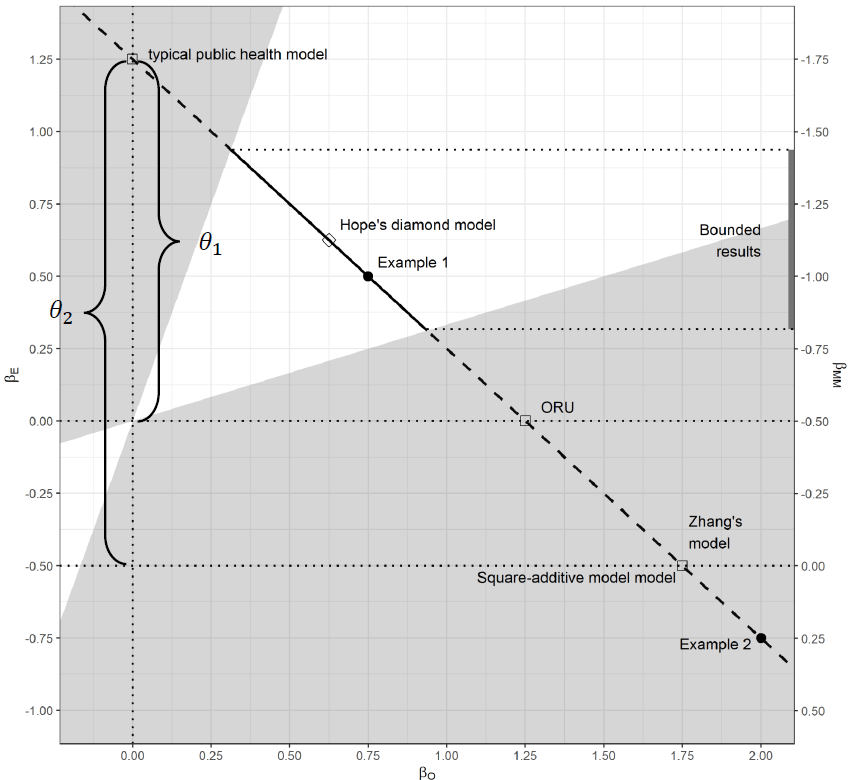
Preprint available at SocArXiv.
The published version is available for free under this link.
Many employees work in jobs that do not match their level of formal education. Status inconsistency theory (SIT) argues that such mismatches result in stress, dissatisfaction, political alienation, and social withdrawal. Status inconsistency may therefore pose a threat to social cohesion. However, extant SIT scholarship does not fully appreciate the consequences of an identification problem due to the perfect collinearity among the effects of occupation, education, and their mismatch. I review the literature and show that prior findings depend on implicit theoretical assumptions that are often implausible once spelled out. To overcome this problem, I propose a new approach to the study of mismatches that builds on recent advances in the modelling of age, period and cohort effects. I demonstrate how a set of relatively weak assumptions that are transparently grounded in sociological theory allows for (partial) identification of mismatch effects. The empirical analysis draws on comparable large-scale survey data from the United Kingdom (UKLHS) and Germany (GSOEP), two countries with a very different institutional organization of education to job matching. Compared with previous research, I use theoretically justified identifying assumptions and provide more rigorous evidence by addressing non-random selection into mismatch. Constrained regression models show mismatch effects on work-related identities, satisfaction, and organizational integration. Contra SIT, my results suggest that the effects of mismatches do not arise from cognitive dissonance but from an expectation formation mechanism. I find only weak evidence that mismatch effects spill over into the political domain. Despite large institutional differences, the results are similar across countries.
Wiedner, J. & Giesecke, J. (2021) Immigrant mens’ economic adaptation in changing labor markets. Why gaps between Turkish and German men expanded, 1976-2015. International Migration Review. Online First. https://doi.org/10.1177%2F01979183211029903

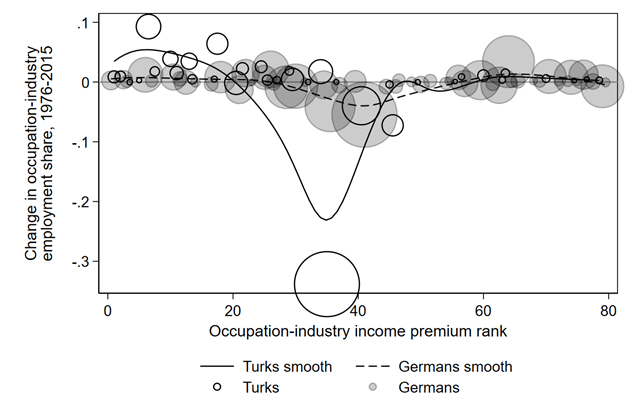
This study examines how macro-social change in Germany has influenced the socio-economic position of male Turkish immigrants. We develop an analytical framework to assess how facets of social and economic change have shaped male immigrant-native gaps in labor market outcomes over time. Empirically, we focus on the first generation of male Turkish immigrants in Germany and use micro-census data spanning almost 40 years. Our methodology contributes a novel empirical quantification of key theoretical arguments to the literature. We find growing inter-group differences between the late-1970s and mid-2000s (employment) and mid-2010s (for incomes), respectively. The growth of differences between the immigrant and the native income distributions was most pronounced in their respective bottom halves. Our analysis show clearly that these trends are linked to the increased value of qualifications, to educational expansion in Germany, and to deindustrialization. Employment shifted away from middling positions in manufacturing, but while Germans tended to move into better paying positions, employment of Turkish immigrants mainly shifted into disadvantaged service jobs. These results provide novel evidence to claims that the economic assimilation of less-skilled immigrants may become structurally harder in increasingly post-industrial societies. We conclude that structural change in host countries is an important, yet often overlooked driver of immigrants’ socio-economic integration trajectories.
Wiedner, J. & Schaeffer, M. (2020) Career Trajectories into Undereducation: Which Skills and Resources Substitute Formal Education in the Intergenerational Transmission of Advantage? Research in Stratification and Mobility, 68, 100526.
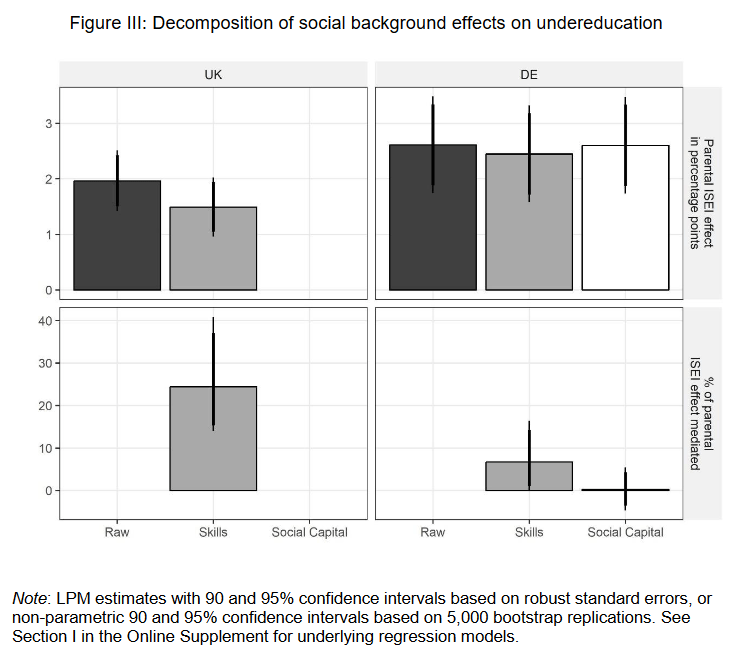
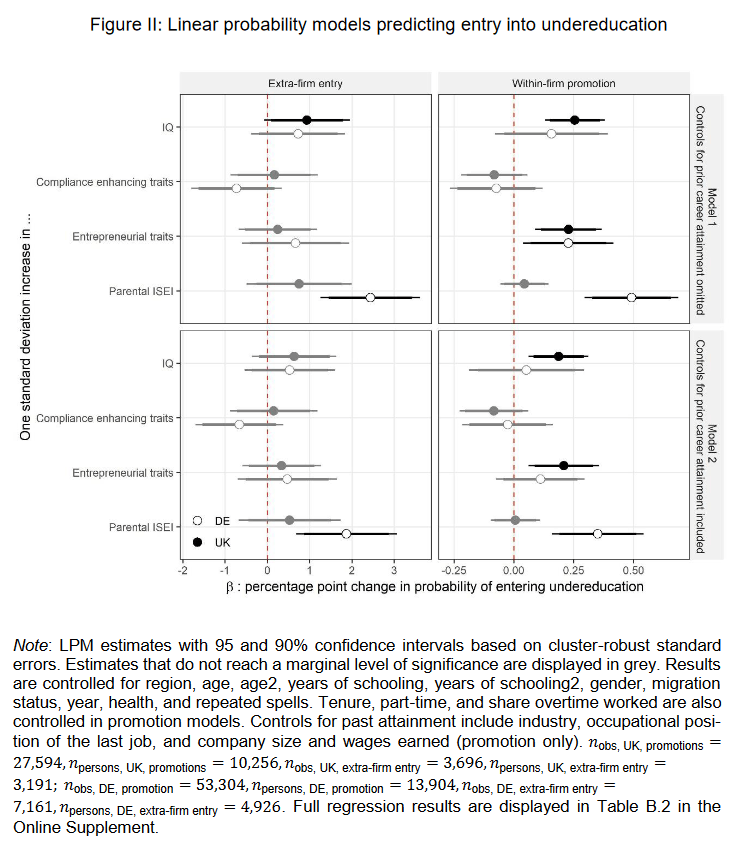
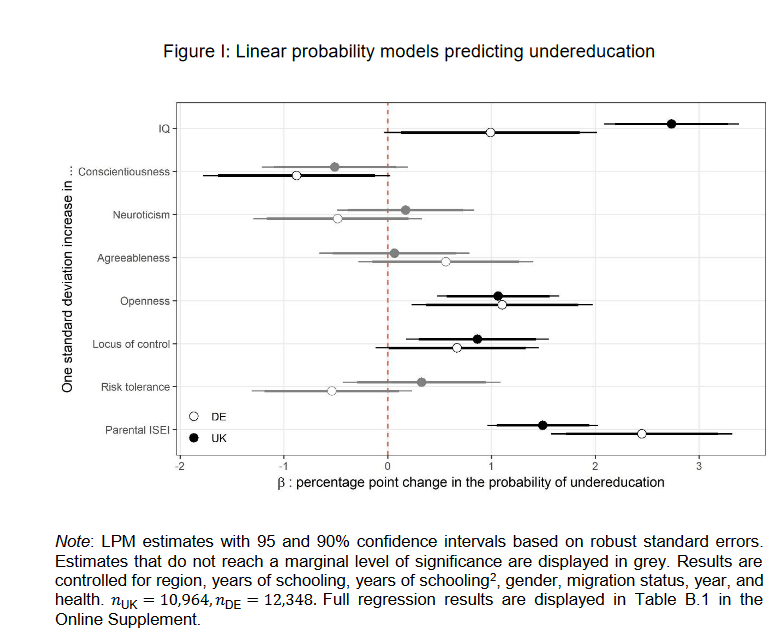
A significant share of employees in Europe has less formal training than is required by their job; they are undereducated. We use harmonized panel data from the United Kingdom and Germany to investigate the skills and resources allowing the undereducated to develop careers in occupations supposedly beyond their reach. Our theoretical approach complements individual-centered labor market theory with an intergenerational mobility perspective which regards undereducation as a form of family status maintenance. Our empirical results show that persons whose (non-)cognitive skills exceed their formal education are more likely to be undereducated in the cross-section, and to enter undereducated employment or be promoted into it throughout the life course. Yet beyond individual merit, parental socio-economic status is a similarly-important predictor of these outcomes; our analyses even trace a significant share of the importance of (non-)cognitive skills to it. To complete our intergenerational argument, we finally demonstrate that undereducation acts as a pathway to the intergenerational reproduction of earnings inequality – more so, in fact, than the avoidance of overeducation. These results are remarkably similar across the UK and Germany, although some country differences suggest higher skill-induced career mobility in Britain and stronger origin effects in Germany. We discuss promising avenues for further comparative research in the conclusion.
A postprint is available on Econstore.
Wiedner, J., Giesecke, J. & Salikutluk, Z. (2020) Wachsende migrationsbezogene Ungleichheit
durch technologischen Wandel? Die Arbeitsmarktposition türkischer MigrantInnen in
Westdeutschland zwischen 1976 und 2013. WSI-Mitteilungen, 73,3. S.165-173.
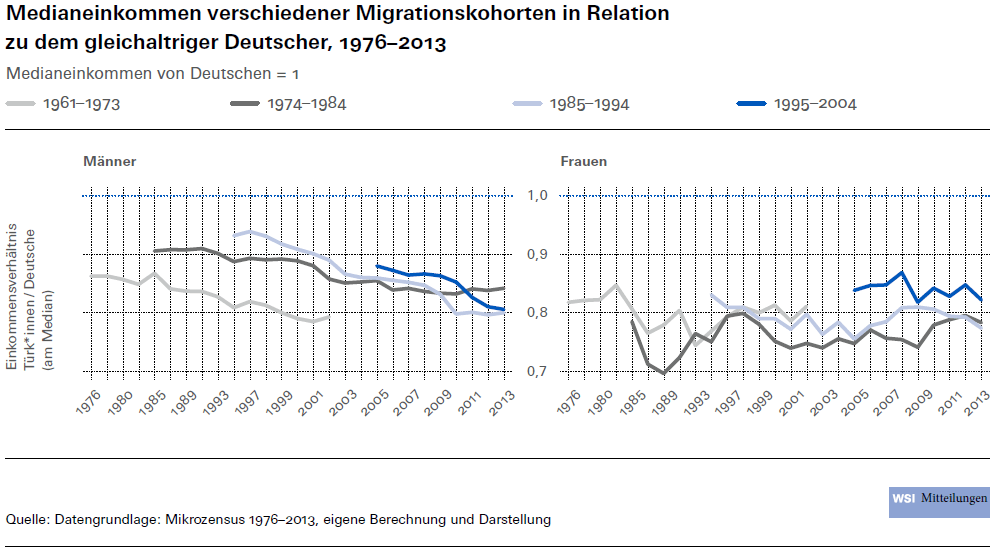
Current debates on structural changes within the German labour market due to technological development rarely touch upon the consequences these changes imply for immigrants. In this article, the authors thus investigate how structural change in the German economy has affected labour market integration amongst immigrants. Using data gathered from the German micro-census between the years 1976 and 2013, they compare the labour market outcomes relating to Germans and first-generation Turkish immigrants. The results demonstrate that the differences in qualification levels between both groups have increased due to educational expansion in Germany. At the same time, formal qualifications have become more important as the German labour market has been increasingly dominated by the service sector. As a result, male Turkish immigrants in particular face increasingly higher unemployment risks, lower occupational positions and lower incomes compared to German nationals. Contrary to the predictions of standard theories, the labour market chances for immigrants have not improved over time. Rather, sectoral change has had negative consequences for the economic integration of the first generation of Turkish immigrants.
dissertation
Wiedner, J. (2020). Against the odds. Education-to-job matches and less-educated workers’ pathways into success. Dissertation, Universität zu Köln.
The dissertation examines the labor market phenomena of over- and underqualification in a comparative research design using quantitative longitudinal data from West Germany and the United Kingdom. Three empirical chapters address three research questions: How does qualification mismatch (over- or underqualification) come about? That is, why are some but not others affected by it (micro-level), and which macro-societal conditions give rise to it? What are the consequences of over- and under-qualification for the affected workers? And finally: What is the relation between institutions of the labor market and the education and training system on the one hand, and qualification mismatch on the other? The dissertation aims to link the micro-level of individual careers with the macro-level of institutions and national patterns of educational expansion. Empirical analyses show that underqualification acts as path to relative occupational success, which is open especially to individuals with high cognitive skills and to those with a great openness to new experiences and internal loci of control. Furthermore, individuals from high-status backgrounds are particularly likely to become underqualified. Underqualification is thus an important factor in explaining intergenerational reproduction of income inequality. Using an innovative statistical approach, the second empirical chapter demonstrates that underqualification has measurable consequences for satisfaction, occupational identities, social integration, and wages of workers. Nevertheless, the results of the new method contradict established theories of status inconsistency as they rule out cognitive dissonance as the driving mechanism. In the third empirical chapter, historical analyses show that educational expansion has led to credential inflation in the United Kingdom, but not in Germany. This result has important implications for theories of educational expansion and challenges classical explanations of rising wage inequality. The final chapter summarizes the findings of the empirical studies and highlights the importance of qualification mismatches for individuals and for the study of social stratification, social change, and social mobility.
public and policy writing
Carol, S., Schaeffer M., and Wiedner, J. (2022) Der Wert Der Nachbarschaft. Wie Vereine Das Wohlbefinden von Immigrant*innen Steigern. WZB Mitteilungen (175):17–20.
Wiedner, J., Schaeffer, M., Carol, S. & Böller, S. (2021) Gebetshäuser, Geschäfte, Vereine. Eine Berliner
Geografie ethno-religiöser Infrastrukturen. WZB-Mitteilungen, 173.
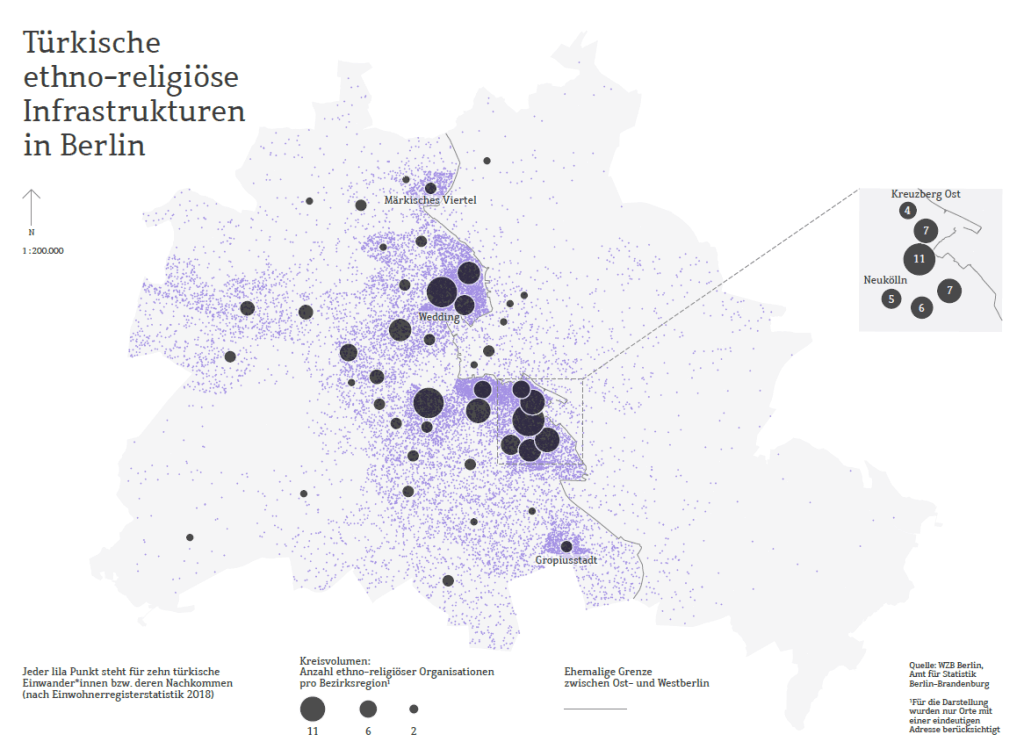
Konrad, M. & Wiedner, J. (2021) Die soziale Dynamik neuer Technologien. Big Data als Herausforderung für die Gesellschaftswissenschaften. WZB-Mitteilungen, 171, S. 58-60.
Machine learning methods and the usage of cloud services cur-rently enter the phase of broad appli-cation in the social sciences. This cre-ates exciting new opportunities for researchers. But does that also mean better research and more reliable re-sults? Not necessarily. New technical means are not simply neutral tools – they form research interests and come along with new limitations and problems.
Wiedner, J., Konrad, M., Koopmans, R. & Laurence, J. (2020) Bowl Alone! Sozialkapital spielt eine
wichtige Rolle für die Akzeptanz von Social Distancing. WZB-Mitteilungen, 168, S. 69-72.
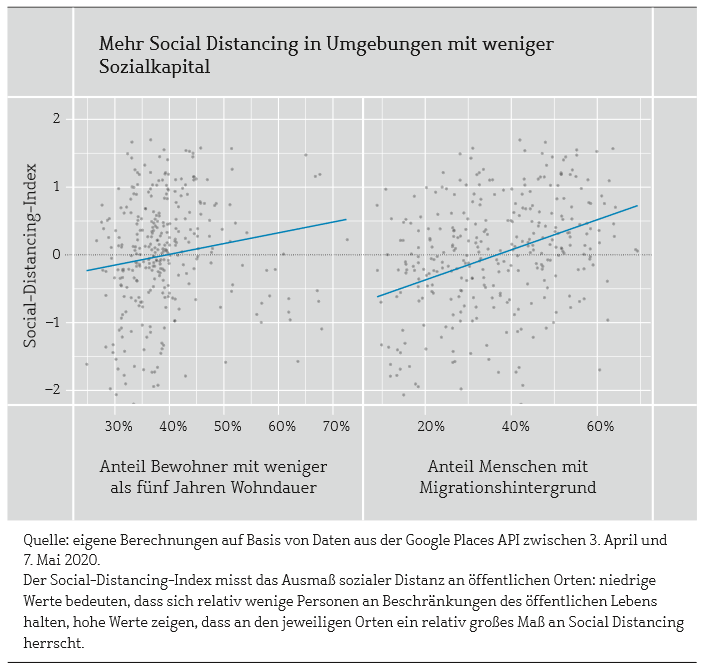
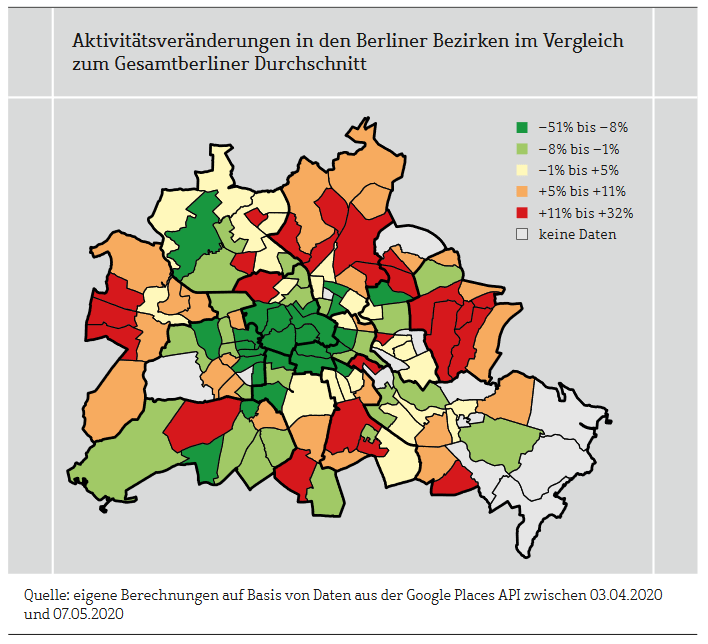
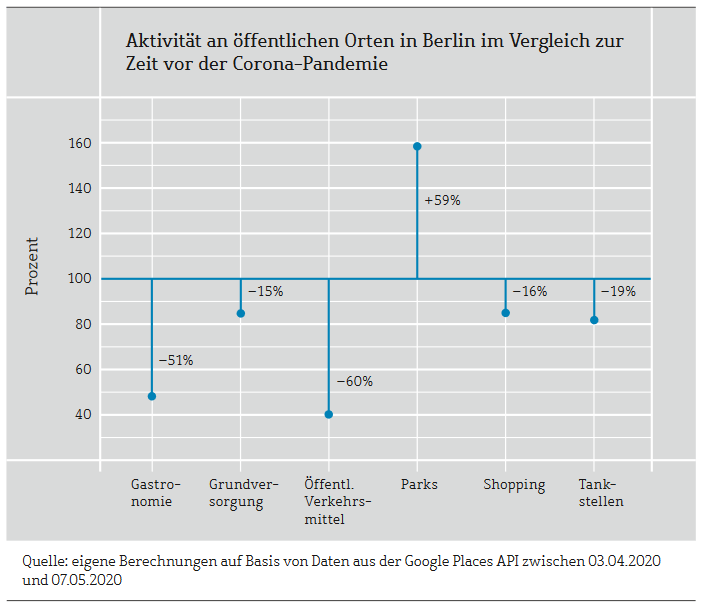
Anonymous trace data from Google Maps can be used to analyze behavioral changes during the Coronavirus lockdown. Data from Berlin collected between early April and early May contradict the hypothesis that social distancing is primarily an instance of the classic collective goods problem. To the contrary, first results show that neighborhood features which typically predict higher stocks of social capital are associated with less social distancing.
Wiedner, J., Salikutluk, Z., & Giesecke, J. (2018a). Arbeitsmarktintegration von Geflüchteten: Potenziale, Perspektiven und Herausforderungen (State-of-Research Papier 07). Osnabrück/Bonn, Institut für Migrationsforschung und Interkulturelle Studien/ Internationales Konversionszentrum.
Der Beitrag fasst den Stand der bisherigen Forschung zur Arbeitsmarktintegration von Geflüchteten zusammen. Wir präsentieren Ergebnisse der Literatur zu Determinanten der Arbeitsmarktintegration und betrachten dabei verschiedene Dimensionen wie Arbeitsmarkt-einbindung, Berufsstatus und Einkommen. Einbezogen werden qualitative und quantitative Arbeiten aus unterschiedlichen Disziplinen, wobei der Schwerpunkt auf deutscher Forschung liegt, aber durch eine internationale Perspektive ergänzt wird. Die bisherigen Befunde wer-den kritisch diskutiert und Desiderate der Fluchtforschung in Deutschland identifiziert. Diese Auseinandersetzung ergibt folgende Kernerkenntnisse:Die Forschungslandschaft ist in Deutschland traditionell durch eine Ausrichtung an adminis-trativen Erfordernissen und politischen Konjunkturen gekennzeichnet. Dem gegenüber hat sich in anderen Zielländern auch eine akademische Flüchtlingsforschung entwickelt. Viele Studien sind oft auf eine eingeschränkte Population bezogen, weisen keinen systematischen Theoriebezug auf und haben einen lokalen oder regionalen Analysefokus. In den letzten Jah-ren wurde aber auch die Infrastruktur für quantitative Forschung zu Geflüchteten auf natio-naler Ebene ausgebaut. Angesichts der anhaltenden Dominanz kurzfristiger Forschungspro-jekte sollte verstärkt in Grundlagenforschung investiert werden.Unter früheren Geflüchteten der 1990er Jahre, wie unter den jüngst Zugewanderten, verteilen sich Bildungsqualifikationen bimodal, das heißt einem relativ hohen Anteil an Personen ohne einen formalen Bildungsabschluss steht ein relativ hoher Anteil an formal gutgebildeten Per-sonen gegenüber. Die Berufsqualifikation besteht für den Großteil hingegen aus Fertigkei-ten, die durch on-the-job-training erlernt wurden. Ob die aktuellen Bestrebungen, formale wie informell erworbene Qualifikationen anzuerkennen, dazu führen, dass diese tatsächlich auf dem Arbeitsmarkt verwertbar sind, ist eine noch offene Frage. Auf Grundlage bisheriger Befunde lassen sich positive Effekte erwarten.Neben fehlenden Qualifikationen und mangelnden Sprachkenntnissen sind rechtliche Unsi-cherheiten die wichtigsten Gründe, die für ArbeitgeberInnen gegen die Einstellung von Geflüchteten sprechen. Dabei haben kleinere und mittelständische Unternehmen andere Anliegen und Bedürfnisse als größere Unternehmen. Der ArbeitgeberInnenperspektive wird jedoch in der bisherigen Forschung wenig Beachtung geschenkt.In der Vergangenheit verlief der Arbeitsmarkteinstieg von Geflüchteten langsamer als bei anderen Zuwanderergruppen. Vermutet wird, dass dies vor allem den rechtlichen Hürden im Arbeitsmarktzugang für Geflüchtete geschuldet ist. Ob der teilweise Abbau von Zugangsbe-schränkungen in Kombination mit den 2015 und 2016 eingeführten Integrationsmaßnahmen die Arbeitsmarktchancen von Geflüchteten erhöhen, ist eine noch zu klärende Frage. Erste Ergebnisse deuten auf eine schwach positive Verbesserung hin.Wie bei anderen Arbeitssuchenden auch, sind persönliche Kontakte für Geflüchtete oft ent-scheidend bei der Suche nach einer Anstellung. Bisherige Befunde deuten darauf hin, dass so gefundene Jobs den über Anzeigen oder Vermittlung gefundenen überlegen sind, was Arbeitsumfang, und -qualität angeht. Allerdings besteht auch die Gefahr, bei der alleinigen Suche über eigenethnische Netzwerke auf Positionen am unteren Ende des Arbeitsmarktes beschränkt zu bleiben.
Link to the project webpage